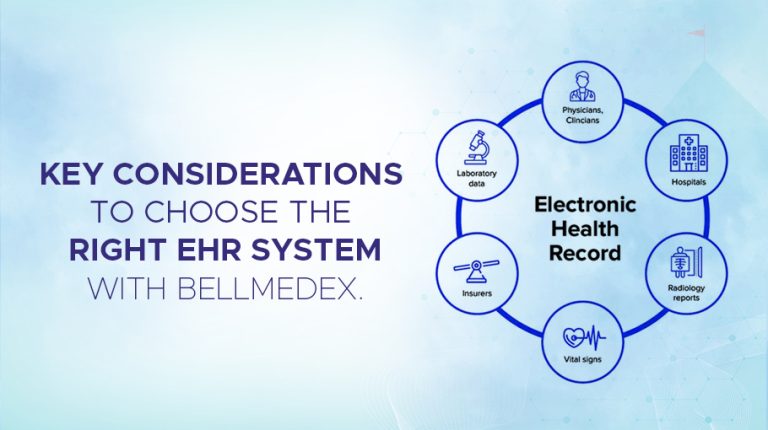Electronic Health Record (EHR) systems are vital tools for healthcare providers, improving patient care, reducing costs, and streamlining administrative tasks. Selecting the right EHR system for your practice is essential. With numerous options available, making an informed decision can be challenging. This article will guide you through important considerations when choosing the right EHR system for your healthcare practice.
The Significance and Necessity of Choosing the Right EHR System
Implementing an EHR system tailored to your practice’s specific needs offers numerous benefits to healthcare providers, staff, and patients alike. Here are some insights and stats to emphasize the significance of selecting the right EHR system for your practice.
Improved Patient Care:
EHR systems enhance patient care by providing a comprehensive view of a patient’s medical history, enabling healthcare providers to make informed decisions. A study published in the Journal of General Internal Medicine found that EHR adoption led to a 3.2% decrease in the odds of in-hospital adverse drug events.
Streamlined Administrative Tasks:
EHR systems help reduce administrative burdens by automating appointment scheduling, billing, and reporting tasks.
Enhanced Care Coordination:
EHR systems facilitate communication between different healthcare providers, fostering better care coordination. According to a 2018 study by the Office of the National Coordinator for Health Information Technology (ONC), 82% of hospitals could electronically view patient health information from outside their system, significantly improving care coordination.
Cost Savings:
Implementing an EHR system can lead to substantial cost savings for healthcare practices. A study by Health Affairs found that small primary care practices using EHR systems saved an average of $15,000 per full-time equivalent provider per year due to operational efficiencies over paper-based systems.
Patient Engagement:
EHR systems often include patient portals that allow patients to access their medical records, book appointments, and communicate with healthcare providers.
Regulatory Compliance:
EHR systems facilitate compliance with regulations like HIPAA and MIPS, enabling practices to participate in federal incentive programs and avoid penalties.
Data Analytics:
EHR systems provide healthcare practices valuable insights into patient populations, enabling them to identify trends and make data-driven decisions. The above insights and statistics underscore the essential role of the right EHR system in healthcare practices. Selecting an EHR system that meets your practice’s needs can free up time for increased quality patient care and bolster your practice’s overall success.
Key Considerations for Choosing a Right EHR System
Assess Practice Needs
Understanding your practice’s unique requirements is the foundation for selecting a right EHR system. Consider the following factors.
Practice size:
Small practices may prioritize affordability and ease of use, while more extensive trials may need advanced features and scalability.
Patient volume:
High patient volume practices may require efficient appointment scheduling and streamlined billing.
Specialties offered: Specialized EHR systems cater to specific healthcare fields, providing tailored features and templates.
Staff’s technical proficiency:
Choose an EHR system that matches your team’s technical skills to ensure a smooth adoption process. Conducting a thorough assessment of your practice’s needs will enable you to focus on EHR systems that meet your specific requirements.
Identify Essential Features
Different EHR systems offer varying features:
E-prescribing:
Electronically send prescriptions to pharmacies, reducing errors and improving patient safety.
Appointment scheduling:
Streamline the scheduling process and minimize appointment conflicts.
Clinical documentation:
Create, store, and manage patient records, including medical histories, diagnoses, and treatment plans.
Billing capabilities:
Automate billing processes and track financial performance.
Identify the features crucial to your practice, and prioritize EHR systems that excel in those areas.
Determine Budget Constraints
Budget considerations are vital when selecting an EHR system. Consider the following pricing models:
Subscription-based pricing:
Pay a recurring fee for access to the EHR system, typically monthly or annually.
Upfront costs:
Pay a one-time fee for the EHR system, with additional charges for support and updates.
Weigh your practice’s financial constraints against the EHR system’s features and select one that balances affordability with functionality.
Evaluate Interoperability
Interoperability enables the seamless exchange of information between different healthcare providers, pharmacies, and labs. A 2020 study revealed that 70% of clinicians reported improved patient care due to EHR interoperability. To ensure a smooth integration, look for EHR systems that support the following:
Health Level 7 (HL7):
A widely-used standard for exchanging healthcare information between systems.
Fast Healthcare Interoperability Resources (FHIR):
A modern standard for exchanging healthcare information electronically.
Examine Vendor Reputation
Vendor reputation is crucial for selecting a right EHR system. Research the following aspects:
Track record:
Review the vendor’s history in the healthcare industry.
Customer reviews:
Read feedback from existing users to gauge satisfaction levels.
Client base:
A large client base indicates the vendor’s ability to deliver reliable solutions.
Analyze Data Security Measures
Data security is crucial for protecting sensitive patient information. Choose an EHR system that:
Meets HIPAA requirements:
Ensures compliance with federal regulations for protecting patient information.
Employs advanced security measures:
Utilizes encryption, multi-factor authentication, and secure data storage.
Ensure Regulatory Compliance
Regulatory compliance is essential for avoiding penalties and participating in federal incentive programs. Select an EHR system that complies with the following:
The 21st Century Cures Act:
Encourages the development of interoperable EHR systems.
The Merit-based Incentive Payment System (MIPS):
Incentivizes healthcare providers for delivering high-quality care.
Consider Ease of Use and Customization
Intuitive and customizable EHR systems improve staff productivity and minimize the learning curve. Prioritize systems that:
Offer user-friendly interfaces:
Simplifies navigation and reduces training time.
Provide customization options:
Allows personalization of templates and workflows to fit your practice’s needs.
Review Support Options
Comprehensive training and support are crucial for successful EHR implementation. Look for vendors that offer:
Ongoing support:
Assists via phone, email, or live chat.
Regular software updates:
Ensures that the EHR system remains up-to-date with industry standards and regulatory requirements.
Test-Drive Potential Systems
Before making a final decision, test-drive potential EHR systems by
Requesting a demo:
A guided demonstration allows you to explore the system’s features and interface.
Seeking a trial period:
A trial period offers hands-on experience to assess the system’s functionality, usability, and compatibility with your practice’s workflow.
By taking the time to evaluate potential EHR systems thoroughly, you can make a well-informed decision that best suits your healthcare practice’s needs and requirements. This investment will lead to improved patient care, streamlined administrative processes, and overall practice success.
Conclusion
Choosing the right EHR system is a vital decision for any healthcare practice. You can confidently select the right EHR system by assessing your practice’s needs, identifying essential features, and carefully considering factors like interoperability, security, and vendor reputation. Investing time in this process will significantly benefit your practice, staff, and patients.




